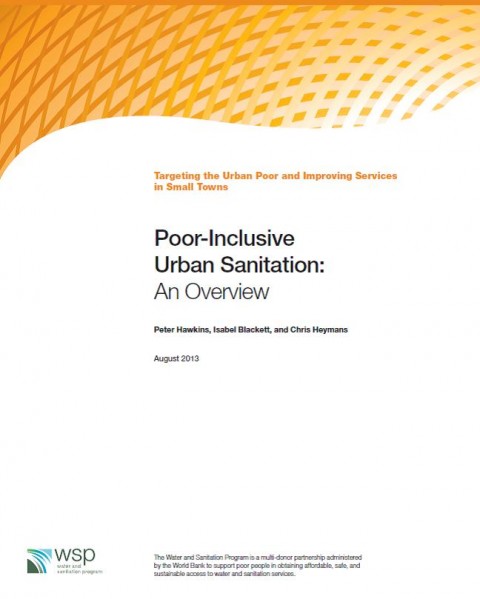Delivering poor-inclusive urban sanitation requires improved service delivery, rather than a focus on infrastructure. This is the core finding of this global review on challenges, trends, and approaches at the global, national and city levels to achieve viable poor-inclusive urban sanitation at scale. After presenting population density as a defining challenge for urban sanitation, the authors analyse the practice of urban sanitation, its technical challenges and the way forward for poor-inclusive service delivery.
The paper highlights key observations and lessons from the original study report: “Delivering Sanitation to the Urban Poor: A Scoping Study (2012; unpublished).
Although this overview of urban sanitation has shown that
the current situation is far from ideal, and that widespread
improvements will not occur at the present rate of progress,
it also identifies initiatives that have potential for wider
replication. There is no “silver bullet” that will deliver improved
sanitation to the developing world’s burgeoning cities,
and some key technical issues remain to be resolved, but
much can be achieved by applying what is already known
and proven in practice.
Delivery of effective sanitation to all urban dwellers requires
the whole chain of services, supported by a combination of
domestic, decentralized, or fully networked infrastructure.
This, in turn, requires an appropriate enabling environment
that can engage the many stakeholders involved, from
communities to national governments, to drive change and
secure sustainable financing for services provided through
both the market and the public sector, reinforced by clearly
defined accountability mechanisms.
Massive investments in infrastructure to address urban
sanitation in developing countries have often resulted in
patchy and unreliable coverage, mostly for richer users, and
frequently leaving poorer communities to fend for themselves.
If urban sanitation is to deliver its full potential public
health, economic, social, and environmental benefits to
urban dwellers, it must reach all communities, as poor excreta
management in one area results in contamination that
can affect all citizens in densely populated urban spaces.
Even where interventions prioritize and target poor neighborhoods,
they should be delivered within a citywide inclusive
approach.
By applying these lessons learned and addressing the technical
issues yet to be resolved, significant progress can be
made over the medium term, in consonance with the post-
2015 agenda of sanitation services for all.
Bibliographic information
Hawkins, P., Blackett, I., Heymans, C. (2013).
Targeting the Urban Poor and Improving Services in Small Towns: Poor-Inclusive Urban Sanitation: An Overview World Bank Water and Sanitation Program (WSP), Washington, USA
Filter / Tags
Faecal sludge treatment processesUrban (entire city)English
Downloads
Poor-Inclusive Urban Sanitation: An Overview
Download
Type: application/pdf
Size: 2.08 MB

Published in: 2013
Pages: 0
Publisher:
World Bank Water and Sanitation Program (WSP), Washington, USA
Author(s):
Hawkins, P., Blackett, I., Heymans, C.
Uploaded by:

